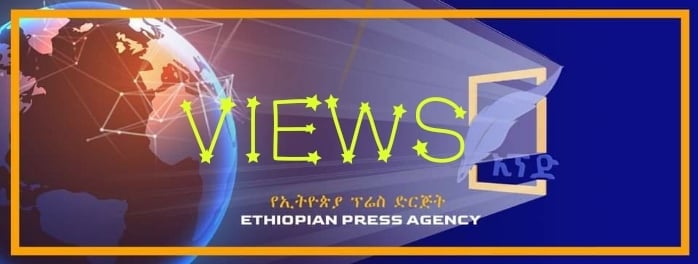
BY LAKACHEW ATINAFU
The land mass to the south of Egypt has been grabbing the concern of explorers, preachers and asylum seekers from every quarters of the globe. Historical incidents witnessed that how the quarter is geopolitically important and the tower watching the worlds logistics, economy and also a strategically significance in combating terrorism.
Ethiopia is the heart, part and parcel of the region as it is the habitat of Afro-asiatic linguistics the gate way to the ocean and sea politics though the then deliberate colonial demarcation and ticking time bomb left Ethiopia land locked and the region the most volatile for the interest of rapacious plan of the western.
Recently, the region began to be observed tracking footprints of Ethiopia in regional integration and rejuvenating the mighty geopolitics of the region. The administration of Prime Minister Abiy Ahmed first envisaged the regional integration of the Horn Countries and astonished the world in settling disputes among east African fraternity. The effort he exerted to bring to end the “No War No Peace” situation between Ethiopia and Eritrea bears a living witness here.
Observing this effort, the world awarded the new Ethiopian leader with Nobel Prize in his governance formative years. However, as time gone by, some elements are still busy of defaming the smart move and initiatives and opted to travel on the track of pessimism and omen.
The new outlook has not been welcomed by some groups of the international community trading the fragmentation of the Horn for their deep rooted greedy interest and the intent to sustain colonial interest.
Deceived nationals, tribal Africans have also been paving the way for their white masters under the guise of religion and ethnicity.
Having passed through temptation and uphill struggles leftover of colonialism, the Horn seemed to have been on the state of the first awake to emancipate the volatile region from foreign external threat.
The concurrent political dynamics and multipolarism brought about the importance of strategic partnership and countries are pacing to collaborate with each other to end the era of suspicion and skepticism and thereby aspire to be the hub of investment for developers.
Having realized the nose poking intent of neocolonialists, the Horn countries in pieces and bits have started the long way to the inclusive freedom and thereby reach the helm of prosperity.
As Ethiopia is the beacon for Africans who had been on the sea of darkness the symbol of African independence, it still manages to steer socioeconomic and political integration of the Horn and the whole continent.
The country has become an idol for the rest of the continent in effectuating the sovereign right of natural resources and always on the forefront for Africans wellbeing.
The International Community missed several opportunities that could have been effectively seized to change course in the Horn. Now there is a risk that the recently declared unilateral humanitarian truce by the Ethiopian government and the national dialogue initiatives may face a similar fate.
If so, the future will be worse than the past. Maximum caution is required. There is a need to leave emotions and the arrogance aside and constructively engage to make sure that these promising initiatives are not missed once again.
The imitative and inception to integrate the Horn and then whole continent is on the driving signal since the new administration of Ethiopia assumed power.
Countries began to follow the value of integration and unison against all odds. Nonetheless, it is also advisable to be on the alert to withstand formidable struggles waged by westerns.
Somalia which sometimes was called the crying child of East Africa opened its eyes and joined Ethiopia’s ambition in integrating the Horn and culminates time of vengeance.
Somali President Hassan Sheikh Mohamud was on a state visit to Kenya to strengthen relations after recent tensions over trade and a maritime border.
Relations between Kenya and Somalia have been deteriorated in recent years. In December 2020, Mogadishu cut off diplomatic ties and accused Nairobi of meddling in its internal affairs after Kenyan President Uhuru Kenyatta hosted the political leadership from Somaliland, a breakaway state that Somalia’s central government does not recognize.
Sheikh Mohamud’s visit to Kenya is the first since the eruption of the maritime dispute, which involves a contested border. The International Court of Justice ruled that the border should be adjusted so that Somalia gets rights to most of an oil-rich part of the Indian Ocean. Kenya rejected the ruling.
Nairobi and Mogadishu agreed in October 2021 that an amicable resolution of the maritime border dispute should be reached soon.
However be it as it may the intent to put card on the table and arguing in a civilized manner might be the beginning of wisdom in regional and international diplomatic spheres and the focal point of Ethiopia in regaining time of mightiness.
Besides, concurrently three east African countries, Ethiopia, Tanzania and kenya ink an accord on the harmonization of TVET according to statements of Ministry of Labor and Skills Development.
Assegid Getachew, Representative of Federal Government of Ethiopia and the Ministry of Labor and Skills and a State Minister said it requires stronger institutional collaboration and coordination amongst all parties concerned at all levels. “I would like to add my utmost assurance that the Ministry is fully prioritizing and supporting the implementation of East African Regional Integrated Project (EASTRIP)”. This project will have quite a lot of benefits, including exploiting economies of scale to lower costs of training for individual countries on specialized and industry certified training programs, facilitating mobility of technology and skilled labor, promoting peer learning among countries and institutions, sharing good policies and practices, and targeting employment toward regional economic corridors such as the Northern and Central Corridor Initiatives and other mega infrastructure projects in the region.
Following our Ministers meeting with the EASTRIP family during the Mid Term Review of the project earlier this year, the three countries have taken on the assignment of expediting implementation and solving bottle necks.
Nature, so proportionate, symmetric provide livers with abundances that man could dominate and reign the cosmos accordingly. In precise terms, Ethiopia traveled distance in man’s most Known history inheriting the ancient empire and civilization down south to Egypt and Mereo.
The complex creation of the Horn can be seen from the perspective of heterogeneity, diverse culture, geopolitics importance, potentiality for agriculture and even can be of great significance to watch over political economy of Africa and the Middle East.
Amid all these, the Horn of African countries, in addition to their common language, culture and religion, and their differences in blood, marriage, and climate change, force them to look at each other because of mutualistic differences in climate, natural and economic resources and products.
It is especially important for Eritrea and Ethiopia and Somalia. For years, the three countries’ leaders have been skeptical about these alternative means of communication. In fact, it has proved to be of little use to many, and it has cost many dearly.
Amid all this optimistic efforts, TPLF and other devastating forces turned to narrate touching individual stories to continue winning the hearts of the US and its allies.
Yuval Harari in his book titled “21 Lessons for the 21st Century” writes that in a moral dilemma concerning an issue, “Focusing on a touching human story that ostensibly stands for the whole conflict helps to generate false moral certainty. When you try to explain to people the true complexity of the conflict by means of statistics and precise data, you lose them”, but when you tell sad personal stories like amputation, rape, disfigurement; you will win their hearts.
We will see how far such stories, maybe imbued with lies and exaggerations, take the whole conflict saga and harden the influence that the target audiences of these stories exert on Ethiopia. But still, it is sad that civilians are the first victims of such conflict which is started by the very group supposed to advance the interest of the Tigray people. No matter how the magnitude of the harm inflicted on civilians is severe, this warmongering group thinks that it can still form its own nation out of the debris of Ethiopia.
The primary objective of any foreign policy is to maintain the security and national integrity of the country.
For countries like Ethiopia, domestic factors are arguably the most important determinants of foreign policy. Domestic problems increase the country’s vulnerability for external interference and decrease its regional and global image and influence. This is exactly what is happening now in Ethiopia. Secondly, for Ethiopia to exert enduring regional influence, it has to achieve the required level of economic development.
Thirdly, Ethiopia’s regional influence requires a well-articulated pragmatic foreign policy that considers the changing regional, continental, and global dynamics and realities. The Horn of Africa and the Red Sea region have witnessed unprecedented changes where major global and regional powers have made bold unilateral and concerted diplomatic measures to increase their presence. Some of such initiatives tend to exclude Ethiopia, thereby threatening to decrease its regional role and influence. Furthermore, the Horn of African region has become a geopolitical playground of major global competitors.
Editor’s Note: The views entertained in this article do not necessarily reflect the stance of The Ethiopian Herald
The Ethiopian Herald 6 August 2022





